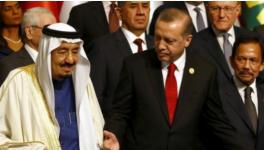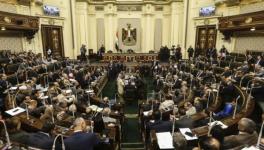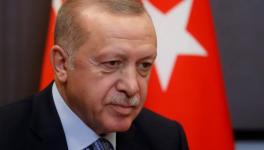After Re-election, Erdogan Likely to Tighten Grip on Turkey

Turkish President Tayyip Erdogan and his wife Emine Erdogan greet supporters at the AKP headquarters in Ankara, Turkey June 25, 2018.
Recep Tayyip Erdogan won a second consecutive term in Turkey’s presidential elections on Sunday, extending his 15-year rule over the country. The victory gives him broad, sweeping executive powers as per amendments to the constitution that were approved in a referendum in 2017. The elections were held amid a state of emergency which was declared after a failed military coup in 2016.
Erdogan received 52.5%of the votes, followed by the main opposition candidate, Muharram Ince of the Republican People’s party (CHP), who won 30.8%, according to the Andalou news agency. The figures emerged after 99% of the votes were counted. Selahattin Demirtas of the pro-Kurdish People’s Democratic Party (HDP) was in third place with over 8% percent of the votes and Meral Aksener of the Nationalist Good (IYI) party was placed fourth with 7%.
Also Read: Turkish Police Launch Crackdown on Anti War Protesters at Boğaziçi University
Erdogan had advanced the elections, which were originally scheduled to be held in November 2019, citing security concerns and the Turkish military operations in Syria. In the simultaneously held parliamentary elections, Erdogan’s AKP (Justice and Development) party came in the first place, and the alliance between the AKP and the Nationalist Movement Party (MHP) won the majority in the parliament. It was the first time that the Turkish people voted for the president and parliament at the same time.
The AKP won 42% of the votes in the parliamentary elections. The CHP received 21% of the votes. The pro-Kurdish HDP obtained 11.5% of the votes, crossing the 10% threshold needed to enter parliament, winning 67 seats to become the second largest opposition party. The MHP, an ally of Erdogan’s AKP, won 11.5% of the votes.
Also Read: Tens of Thousands of Public Servants Still Jailed as Turkey's Repressive Erdogan Meets Trump
Under the new system, the authority of Parliament has been significantly reduced and the post of the prime minister has been abolished. Parliament’s powers of oversight over the executive branch have also been done away with. Erdogan, as President, has the powers to appoint members of the next government, including from outside the parliament, as well as senior judges. He can also plan the budget and issue decrees as laws. He would also have extraordinary powers to declare a state of emergency and announce general elections.
Since the failed coup attempt of 2016, which Erdogan blamed on his former ally-turned-rival Fethullah Gulen, a violent crackdown was initiated against the latter’s followers. Over 160,000 people were arrested and detained, and thousands of government employees and soldiers fired from their jobs. The HDP’s Selahatting Demirtas conducted his election campaign from inside a prison, where he is facing trial on terrorism charges.
Turkey’s economy has been going through a sluggish phase, which analysts say might have contributed to Erdogan’s decision to advance the elections. The Turkish Lira has lost 20% of its value against the US dollar, and inflation had risen to double digits, causing concern among the public over the rise in essential items such as potatoes and onions.
Get the latest reports & analysis with people's perspective on Protests, movements & deep analytical videos, discussions of the current affairs in your Telegram app. Subscribe to NewsClick's Telegram channel & get Real-Time updates on stories, as they get published on our website.
























